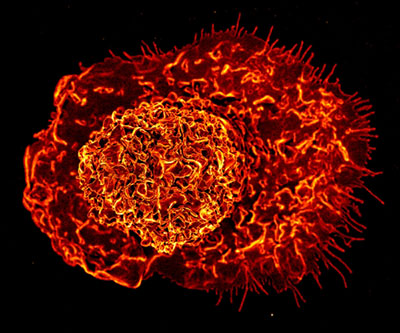
Microscopy image of a macrophage, a type of immune cell.
Credit: NIAID, NIH
Infections during pregnancy can lead to poor health outcomes, including life-threatening conditions, for the fetus and the pregnant woman. In the past, researchers thought that pregnancy suppressed maternal immune responses, making a woman more vulnerable to infections. Now, researchers know that maternal immune responses are tightly regulated to maintain a balance—enough to defend against infectious microbes without attacking the fetus.
The bacteria Escherichia coli (E. coli) is a common cause of severe, life-threatening infections during pregnancy. When infections occur in the third trimester, it can lead to preterm birth and other complications. In a study led by Dr. Nardhy Gomez-Lopez of the Pregnancy Research Branch, researchers compared immune responses to E. coli between pregnant and non-pregnant women. They focused specifically on maternal immune cells called monocytes and neutrophils, which are important first-line defenders against E. coli.
The study team took blood samples from volunteers during their third trimester and exposed the cells to E. coli and a product of E. coli, endotoxin, which triggers immune responses. They found that pregnancy increases the ability of maternal monocytes and neutrophils to take up bacteria and eliminate them through the production of reactive oxygen species, or ROS, which damages bacteria. The study team also found that pregnancy tailors the types of cytokines and chemokines secreted by monocytes and neutrophils, which help coordinate subsequent immune responses. Moreover, they observed that immune cells from pregnant women had different frequencies of monocyte subtypes.
Overall, the study offers a comprehensive analysis of how pregnancy tailors immune responses against E. coli in the third trimester.
Learn more about the Maternal-Fetal Medicine & Translational Imaging Group: https://www.nichd.nih.gov/about/org/dir/affinity-groups/MFMTI
 BACK TO TOP
BACK TO TOP